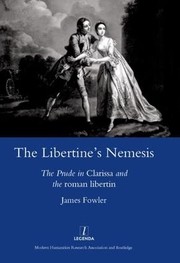
The libertine's nemesis
By J. E. Fowler
Subjects: French fiction, history and criticism, Libertinism in literature, Prudence in literature, BIOGRAPHY & AUTOBIOGRAPHY, Clarissa (Richardson, Samuel), Roman européen, Criticism and interpretation, Prudence dans la littérature, Literary, Crebillon, claude-prosper jolyot de, 1707-1777, European fiction, History and criticism, Histoire et critique, Sade, marquis de, 1740-1814, Laclos, choderlos de, 1741-1803, Libertinage dans la littérature
Description: "What is the role of the prude in the 'roman libertin'? James Fowler argues that in the most famous novels of the genre (by Richardson, Crébillon fils, Laclos and Sade) the prude is not the libertine's victim but an equal and opposite force working against him, and that ultimately she brings retribution for his social, erotic and philosophical presumption. In a word, she is his Nemisis. He is vulnerable to her power because of the ambivalence he feels towards her; she is his ideological enemy, but also his ideal object. Moreover, the libertine succumbs to an involuntary nostalgia for the values of the seventeenth century, which the prude continues to embody through the age of Enlightenment. In Crébillon fils and Richardson, the encounter between libertine and prude is played out as a skirmish or duel between two individuals. In Laclos and Sade, the presence of female libertines (the Marquise de Merteuil and Juliette) allows that encounter to be reenacted within a murderous triangle"--Publisher's description, p. [4] of cover.
Comments
You must log in to leave comments.